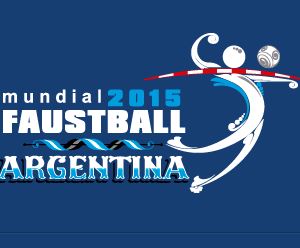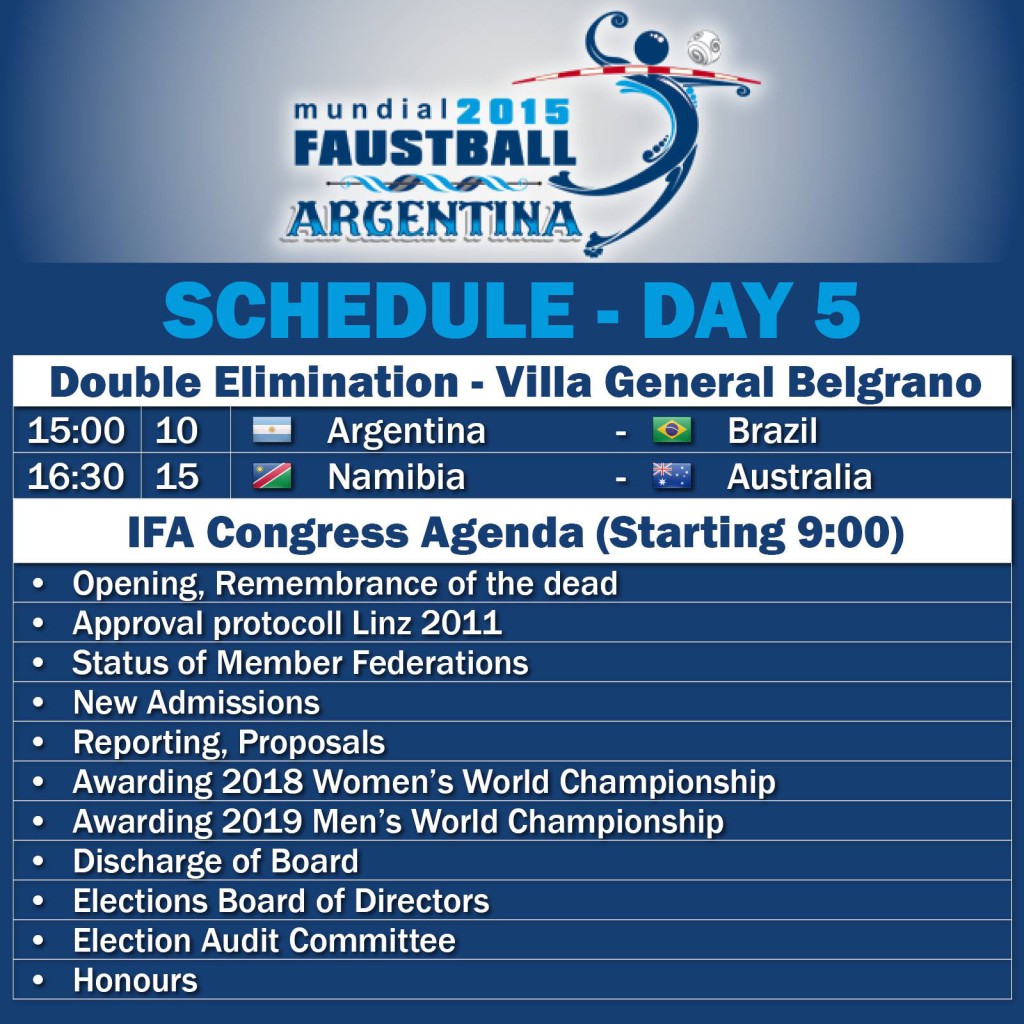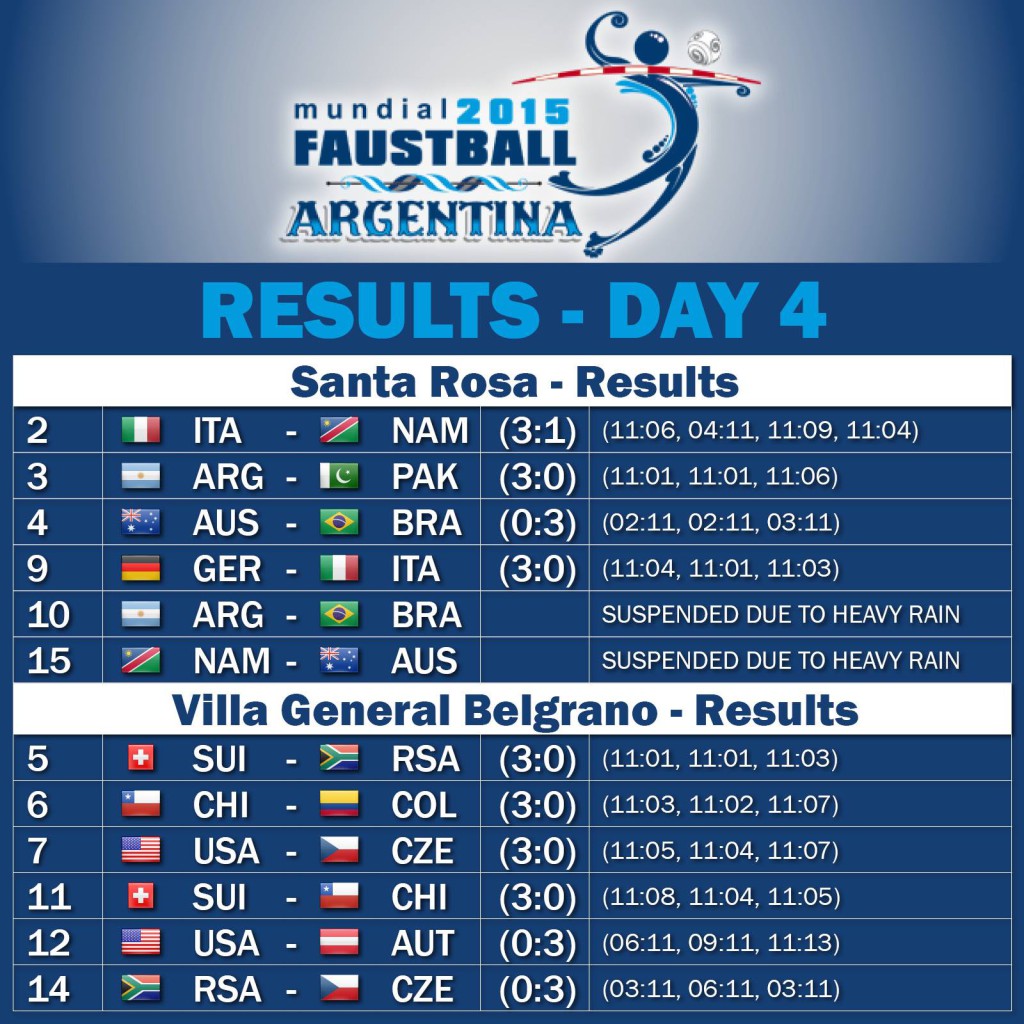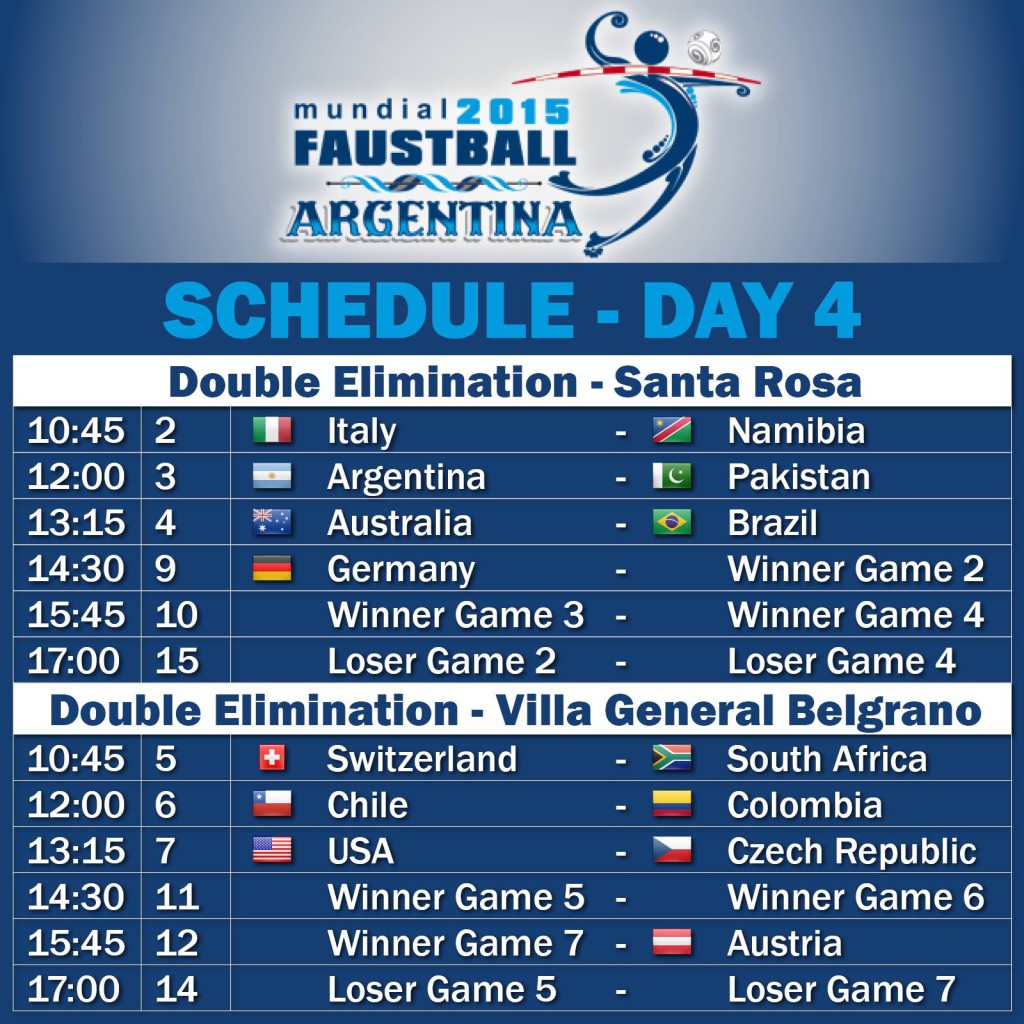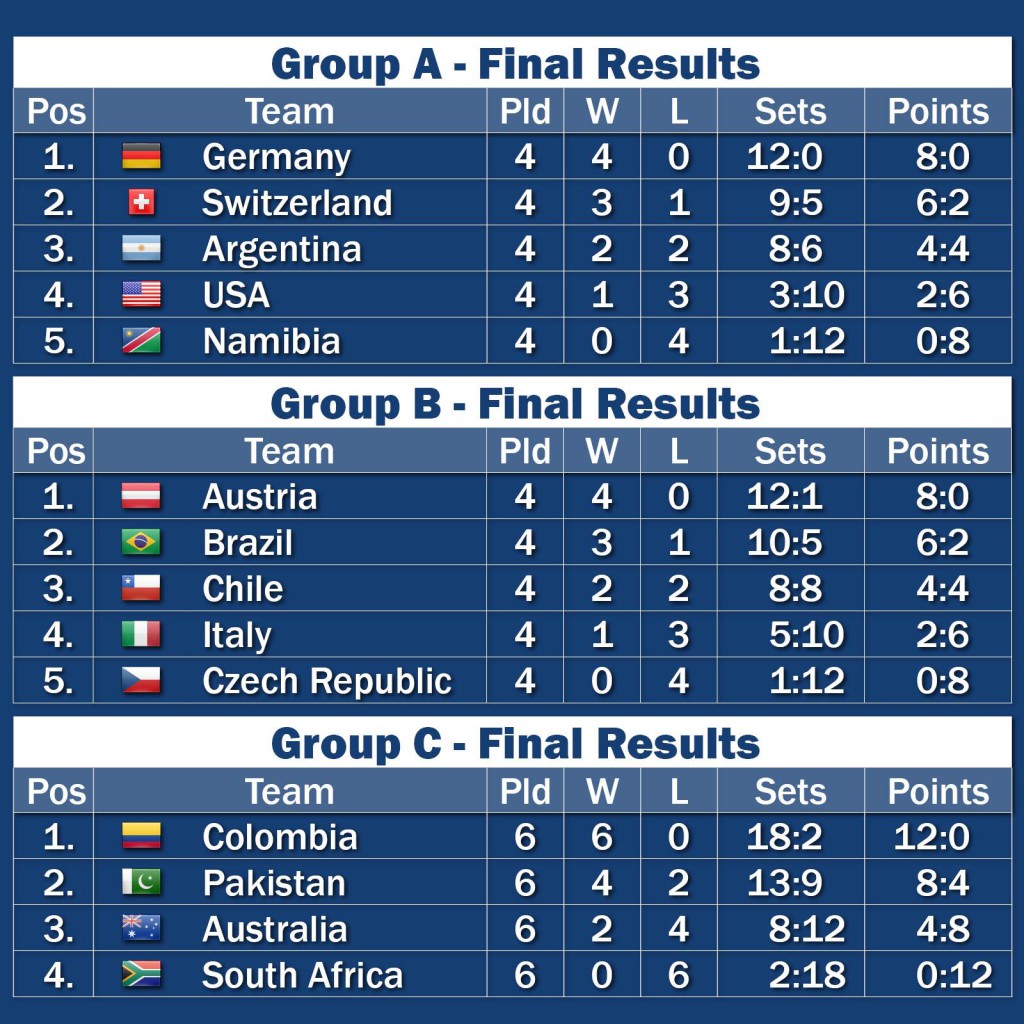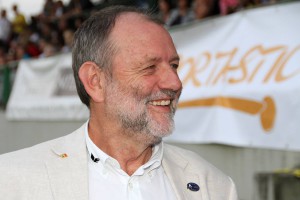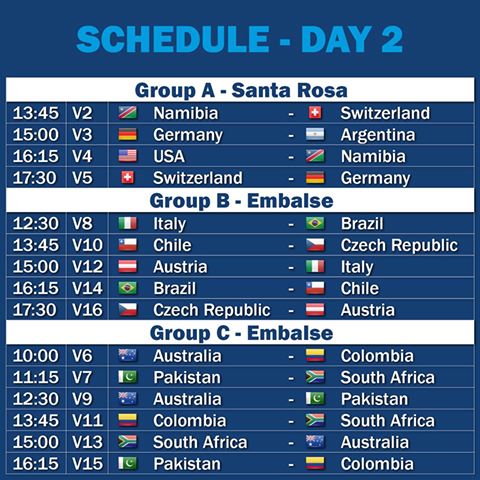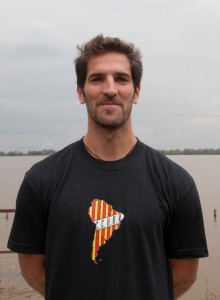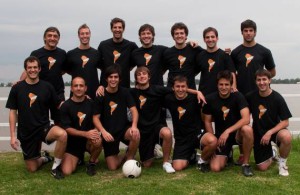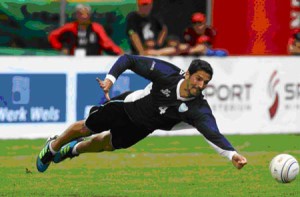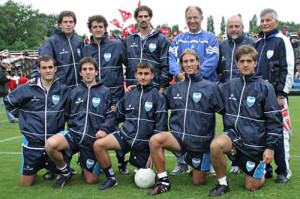.
„Wir gehen top vorbereitet in die WM, von uns aus kann es sofort losgehen.“
Wir haben Olaf Neuenfeld (seit 2005 Bundestrainer) und Fabian Sagstetter (A-Nationalspieler seit 2009) zum Interview getroffen und nach den Zielen der deutschen Nationalmannschaft in Argentinien befragt.
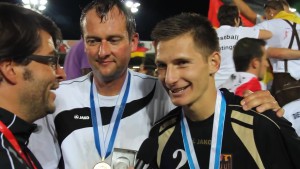
IFA: Derzeit sind sämtliche internationale Titel, egal ob Jugend, Junioren oder Aktive, Frauen oder Männer, in deutscher Hand – einzige Ausnahme ist der EM-Titel der U18-Mädels. Der Adler auf der Brust scheint derzeit eine Gold-Garantie zu sein. Was ist der Grund für die Dominanz in letzter Zeit?
Neuenfeld: Wenn man sich die einzelnen Ergebnisse der Endspiele einmal anschaut, sieht man, wie knapp jedes Spiel war und das jedes auch genauso gut hätte anders herum ausgehen können. Das ist derzeit nur eine Momentaufnahme, zugegeben aber eine sehr schöne für uns alle. Eine Gold-Garantie ist der Bundesadler aber nicht, jeder Erfolg muss immer wieder hart erarbeitet werden.
Sagstetter: Dass alle wichtigen Titel in Deutschland sind, ist ein hervorragender Zustand, auf dem man sich allerdings nicht ausruhen sollte. Damit es auch in der Zukunft Erfolge zu feiern gibt sollte die Jugend weiter gefördert werden. Auch in den anderen Nationen wird akribisch gearbeitet. Vor allem die Weltspitze bei den Männern ist in den letzten Jahren näher zusammen gerückt.
IFA: Zeichnet sich hier ein längerer Lauf ab, oder war der Umbruch zu jüngeren Spielern in Deutschland nur früher als bei bspw. Österreich oder der Schweiz?
Sagstetter: Im A-Kader wurde der Umbruch schon vor einigen Jahren eingeleitet. Mittlerweile sind wir mit unserem Kader sehr gut eingespielt. Die Schweiz hat ihren Umbruch 2012 eingeleitet und dann sofort den EM-Titel geholt und stand danach bei den großen Turnieren immer im Finale. Auch in Österreich gehe ich von einem Umbruch in den nächsten Jahren aus.
Neuenfeld: Ich hoffe, dass sich ein längerer Erfolgslauf abzeichnet, aber bei der Leistungsdichte gerade im Männerbereich kann man sich da nie sicher sein. Die anderen Nationen setzen auch immer wieder auf junge Spieler und arbeiten ähnlich wie wir. Da sehe ich keine Unterschiede.
IFA: Mit 25 ist Fabian schon einer der erfahreneren Spielern im Team, und dennoch gewinnt Deutschland seit Jahren Titel. Was macht Deutschland der Nachwuchsarbeit besser bzw. anders? Oder haben wir derzeit einfach das Glück einer „Golden Generation“?
Neuenfeld: Wir haben gerade im Männerbereich in Deutschland zwischen den Jahren 2001 und 2010 eine lange Durststrecke ohne Titel gehabt. 2005 haben wir dann angefangen, im Nachwuchsbereich früher und intensiver auf Bundesebene die Talente zu sichten und zu fördern. Bei diesem ersten Bundesnachwuchslehrgang 2005 tauchten das erste Mal Namen wie Fabian Sagstetter, Patrick Thomas, Sebastian Thomas, Tim Albrecht, Niklas Ehrhardt, Carsten Scheerer und Mats Albrecht auf. Diese Spieler sind heute alle Mitglieder im A-Kader und die kontinuierliche Arbeit im Nachwuchsbereich ist für die derzeitigen Erfolge mitverantwortlich. Man kann sicherlich sagen, dass wir aktuell über eine „Goldene Generation“ verfügen.
Sagstetter: Ich denke, dass wir schon in den letzten Jahren immer eine gute Mischung aus erfahrenen und jungen Spielern hatten. Im Jugendbereich haben wir mit Hartmut Maus und Roland Schubert erstklassige Trainer die laufend Talente an den A-Kader heran bringen. Im A-Kader wiederum profitieren wir im Moment von einem sehr breiten Kader, so haben wir auch Spieler die auf einem sehr hohen Niveau sind und den Sprung ins WM-Team in diesem Jahr nicht geschafft haben.
IFA: Fabian, du warst als Spieler schon in Kolumbien, Namibia, Taiwan und natürlich überall in Europa unterwegs. Wie kann man die Faustballbegeisterung weltweit vergleichen? Wo hat sie dich am meisten überrascht/begeistert?
Sagstetter: Faustballbegeisterung habe ich bei allen Veranstaltungen erlebt. Natürlich waren die World Games in Taiwan und Kolumbien besonders, da viele Zuschauer dort zum ersten Mal beim Faustball zugeschaut haben. Und die beiden Weltmeisterschaften in Deutschland 2007 (als Zuschauer) und in Österreich 2011 (als Spieler) haben gezeigt, dass große Faustballveranstaltungen absoluten Eventcharakter haben und ganze Stadien füllen können.
IFA: Olaf, vor kurzem haben wir auf Facebook ein T-Shirt gesehen zu 10 Jahre Bundestrainer. Hast du schon mal ans Aufhören gedacht? Wie viele Titel möchtest du noch holen?
Neuenfeld: Ich hatte nach den World Games 2013 einmal kurz ans Aufhören gedacht, aber mehr aus privaten Gründen. Aber die Arbeit mit den Jungs macht so viel Spaß, dass ich das dann wieder revidiert habe. In Absprache mit den Verantwortlichen der DFBL haben wir den „Vertrag“ erst mal bis 2017 verlängert. Bis dahin gibt es noch 3 Titel zu gewinnen. (lacht) Was danach kommt kann ich jetzt noch nicht sagen, ist aber derzeit auch nicht so wichtig.
IFA: Fabian, du hast schon jetzt mit der Nationalmannschaft alles gewonnen, was nur geht (U18 EM & WM, U21 EM, Welt-/Europameister und World-Games-Sieger mit dem A-Kader). Bei Patrick Thomas ist es noch schlimmer, da er auch mit dem Verein schon alles gewonnen hat. Besteht die Gefahr, dass es aufgrund mangelnder Ziele langweilig wird, wie es zum Beispiel bei Magdalena Neuner (Biathlon) der Fall war, die dann mit 25 aufgehört hat, oder ist der Spaß am Faustball groß genug?
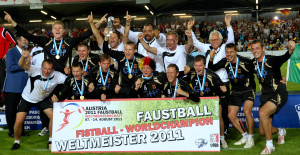
Sagstetter: Der Spaß am Faustball ist riesig und ich bin immer noch sehr motiviert im Training und in den Spielen. Jedes Länderspiel mit dem Adler auf der Brust ist eine Ehre und mein Ziel ist es noch einige Jahre auf diesem Niveau zu spielen. Dass Patrick Thomas so erfolgreich ist, spricht für ihn und die Art und Weise wie das Team in Pfungstadt arbeitet. Auch die Nationalmannschaft profitiert vom hohen Niveau im Pfungstädter Team.
IFA: Wie ist das Verhältnis im Team unter den Spielern? Gibt es eine Hackordnung oder ist das alles sehr locker? Und wie ist es dem Trainerstab gegenüber? Ist Olaf der große Tyrann oder der einfach etwas ältere Teil des Teams?
Neuenfeld: Ich versuche genauso wie Chris (Löwe) ein Teil der Mannschaft zu sein. Klar sitzen wir Trainer auch mal alleine zusammen, um interne Dinge zu besprechen, aber meistens halten wir und im Mannschaftskreis auf und suchen die Nähe der Spieler. Bei uns geht es immer sehr lustig zu und ich bin ja selbst auch für eine gewisse Selbstironie bekannt. Ich halte das Verhältnis Trainer – Spieler für sehr gut. Ich hoffe die Spieler sehen das ähnlich. (lacht)
Sagstetter: Da kann ich nur zustimmen. Ich bin seit 2009 dabei und wir haben uns immer durch unseren Zusammenhalt ausgezeichnet, auch als die Erfolge noch nicht da waren. Chris und Olaf haben eine klare Linie, beziehen uns aber immer wieder in ihre Entscheidungen mit ein.
IFA: Und zum Abschluss: Kann es für den Titelverteidiger in allen Wettbewerben ein anderes Ziel geben als wieder oben auf dem Treppchen zu landen?
Sagstetter: Wir haben hart gearbeitet, sind gut vorbereitet und haben ein starkes Team, somit ist das Ziel der WM-Titel.
Neuenfeld: Natürlich ist unser Ziel der Weltmeistertitel. Alles andere würde uns eh keiner glauben und wir selbst auch nicht. Wir haben uns die Favoritenrolle durch die letzten Erfolge selbst zuzuschreiben, aber wir nehmen sie auch gerne an. Wir haben uns aber nicht darauf ausgeruht und in diesem Jahr so hart und intensiv wie noch nie gearbeitet. Aber alle haben voll mitgezogen und einige Spieler haben sich sogar noch zu zusätzlichen Trainingseinheiten in den letzten Wochen getroffen. Wir gehen top vorbereitet in die WM und sind bereit. Von uns aus kann es sofort losgehen.
IFA: Vielen Dank, dass ihr beide euch Zeit genommen habt und viel Erfolg bei der Mission Titelverteidigung. Von deutscher Seite werden sicherlich viele gedrückte Daumen Richtung Cordoba zeigen.
Interview: Nico Bitsch, Germany
===============
ENGLISH VERSION
Olaf Neuenfeld (Coach) and Fabian Sagstetter (Defensive Player) – Germany
“We are perfectly prepared for the World Cup, we are ready to start off right now!”
We asked Olaf Neuenfeld (National Coach since 2005) and Fabian Sagstetter (National Player since 2009) about the aims of the German National Team in Argentina.
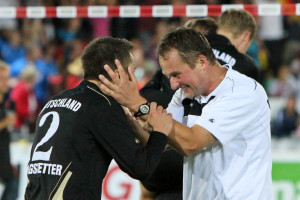
IFA: At the moment, all international titles, from youth to women or men, are at held by the Germans. The only exception is the European Cup for the U18-Girls. The German Eagle on the chest seems to be a guaranty for the gold medal. What is the reason for this dominance over the last two years?
Neuenfeld: If you look on the results of the single finals, you can see, that every match was very close und could have ended the other way around. That is only a momentum, but a really nice, I have to admit. A guaranty for gold doesn’t exist but you have to work hard for every single success.
Sagstetter: It is a great state, that all important titles are in Germany, but we shouldn’t relax on it. To celebrate success in the future the youth work should be forced, the other nations are working as painstaking as we do. All the international top teams are playing on a level very close to each other.
IFA: Was it only because of an earlier change to young players compared to Austria or Switzerland?
Sagstetter: We started with the introduction of young players to the team some years ago and now we are very well-rehearsed with our team. Switzerland started in 2012 and became European Champion directly. In Austria I expect to see more young talents in the next years too.
Neuenfeld: I hope, there will be a longer run of success, but with that density of world-class athletes you never can be sure of. The other nations also give trust to their younger players and work similar like we do.
IFA: At the age of 25, Fabian is one of the most experienced players on the team, but Germany is still winning all the titles. What is Germany doing different than the other nations? Or is it simply a “Golden Generation”?
Neuenfeld: We had won no titles between 2001 and 2011. In 2005 we finally started, to look for talents in the whole country on junior level. At this first training course names like Fabian Sagstetter, Patrick Thomas, Sebastian Thomas, Tim Albrecht, Niklas Ehrhardt, Carsten Scheerer and Mats Albrecht appeared for the first time. All these players are part of the national team now and this work in the youth is also responsible for the success now. But sure you can say that we are having a “Golden Generation” at the moment.
Sagstetter: I think in the last years, we always had a very good mix of young and experienced players. With Roland Schubert and Hartmut Maus we got two first-class coaches in our U18 and U21 national teams, who are bringing talents for the A-Team all the time.
IFA: Fabian, you have been to Colombia, Namibia, Taiwan and everywhere in Europe as a player. How can you compare the enthusiasm for fistball all over the world?
Sagstetter: I felt the enthusiasm in every single of those countries. Of course the World Games in Taiwan and Colombia were very special, because lots of spectators there saw fistball for the first time. And the both World Cups in Germany 2007 (as a visitor) and Austria 2011 (as a player) showed, that big fistball tournaments are real events and can fill up whole stadiums.
IFA: Olaf, a few days ago we could see a shirt on facebook honouring you for the 10th consecutive year as coach. Have ever thought about retiring from the team? How many titles do you want to win before this happens?
Neuenfeld: I thought about quitting this job after the World Games 2013 because of private reasons. I enjoy the work with the guys and so I redeemed it. I renewed my contract with the DFBL until 2017. There are there big competitions in this period, so you know what we want. (laughs) I don’t know what’s coming after the end of this contract but it isn’t important for me at the moment.
IFA: Fabian, you won every possible title with the national team (U18 European and World Champion, U21 European Champ, Men’s European- and World Champion and World Games winner). The only one with more titles is Patrick Thomas, because he won everything with his club too. Is there a danger of getting bored because of no more goals, like it happened with Magdalena Neuner (German biathlete), who retired at the age of 25 or is fistball fun enough?
Sagstetter: The joy I have with playing fistball is high enough and I’m very motivated in every training and every match. Every Game with the eagle on the chest is very special and a big honour for me and I hope I can play on this level for some more years. The reason why Patrick is that successful is the way they work in Pfungstadt. And also the national team benefits from the high level in Pfungstadt.
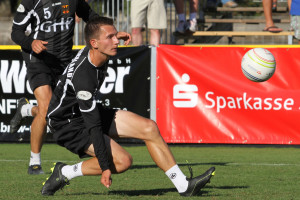
IFA: How is the atmosphere on the team between the players? And how is the relationship to the coaches? Is Olaf a tyrant or is he simply the part of the team who is a little bit older?
Neuenfeld: Me and Chris (Löwe) try to be part of the team. Of course sometimes the coaches are sitting for their own, to discuss intern things, but mostly we are close to the players. It is always fun with us and I am known for a little self-mockery. I think the relation between players and coaches is pretty good. I hope the opinion of the players is similar. (laughs)
Sagstetter: I can only agree. I am part of the team since 2009 and the whole team known for a very good team spirit, even when we had no success. Chris and Olaf have a clear opinion, but also ask about ours.
IFA: And the last question: Can the current World Champion have a different goal apart from standing on top of the podium again?
Sagstetter: We worked very hard, prepared very well and have a strong team. So the aim is the win the title again.
Neuenfeld: Of course our aim is to win the World Championship. Nobody would believe anything different and we wouldn’t do as well. We are responsible for our favorite role ourselves by the success in the last years and we accept this gladly. But we didn’t rest on this and worked as intensive and hard like never before. Everyone took part and some players met by themselves for some extra sessions in the last weeks. We are perfectly prepared for the World Cup. We are ready to start off right now!
IFA: Thanks a lot for taking to us and good luck for the mission “title defence”.


 Deutsch
Deutsch